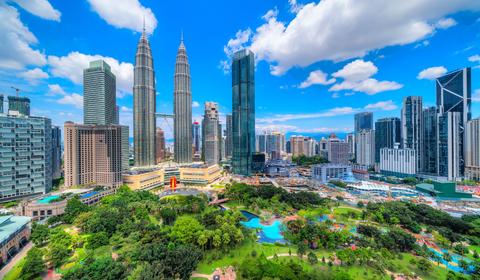
MALAYSIA’S GREEN PLAN: PAVING THE WAY FOR A SUSTAINABLE FUTURE
In July 2023, Malaysia embarked on a transformative journey by unveiling its National Energy Transition Roadmap, signalling a profound commitment to addressing climate change and embracing sustainable energy solutions. As the nation charts a new course toward a greener, cleaner future, it's essential to explore how this roadmap will impact Malaysia in the near future.
A Paradigm Shift Towards Sustainability
Malaysia's National Energy Transition Roadmap represents a significant paradigm shift for the nation, transcending conventional energy practices and emphasising sustainability. The roadmap will scale up its renewable energy capacity and reduce its growing dependence on natural gas imports, according to the Ministry of Economy.
The roadmap identified 10 flagship projects, including plans to build a one-gigawatt solar photovoltaic plant — Southeast Asia’s largest — that can directly covert sunlight into energy, the ministry said.
Solar power has remained the most encouraging segment of Malaysia’s renewable energy landscape since 2011, with an installed capacity compound annual growth rate of 48%, according to the authorities.
Other planned developments include an integrated renewable energy zone, five centralised large-scale solar parks and three green hydrogen production plants. These projects will leverage Malaysia’s estimated 290 gigawatts of technical renewable energy potential to create a more resilient, low-carbon power system, said the ministry.
Here are some of the key elements that will reshape Malaysia's energy landscape in the coming years:
- Renewable Energy Advancement: The roadmap positions Malaysia to harness the power of renewable energy sources, such as solar and hydroelectric power. These sources will reduce the nation's dependence on fossil fuels and decrease its carbon footprint, fostering a more sustainable energy mix.
- Energy Efficiency Measures: The roadmap places a strong emphasis on enhancing energy efficiency across all sectors, from industry to transportation. By reducing energy waste, Malaysia will not only mitigate environmental impacts but also stimulate economic growth through reduced energy costs.
- Carbon Neutrality Commitment: Malaysia has set an ambitious goal to achieve carbon neutrality by 2050. This commitment involves rigorous emissions reduction across various sectors and investing in carbon offset projects, which will mitigate the nation's environmental impact.
Economic and Environmental Implications
Malaysia's energy transition has profound implications for its economic and environmental landscape, with both positive and transformative consequences.
Economic Diversification: As Malaysia expands its renewable energy sector, new job opportunities and industries will emerge. The shift towards sustainable technologies, energy efficiency, and the development of green infrastructure will foster economic diversification, reduce reliance on fossil fuel imports, and strengthen energy security.
Global Competitiveness: By adopting a forward-thinking energy transition strategy, Malaysia positions itself as a competitive player in the global market. Clean and sustainable energy solutions not only reduce operating costs for businesses but also align with the values of eco-conscious consumers worldwide.
Environmental Benefits: Malaysia's commitment to reducing carbon emissions and improving energy efficiency contributes to a healthier environment. Cleaner air, reduced pollution, and sustainable land and water resources will lead to better overall quality of life for its citizens.
Key Challenges and Potential Solutions
While the general outlook for Malaysia's energy transition is promising, it does come with challenges. Addressing these challenges will be crucial to ensure a smooth and successful transition.
Infrastructure Development: Building a robust infrastructure for renewable energy generation and distribution is essential. The government and private sector could collaborate to invest in infrastructure and create an efficient grid that can accommodate increasing renewable energy capacity.
Energy Transition Financing: Financing the transition to clean energy can be costly. Malaysia can explore innovative financial mechanisms, incentives, and partnerships to attract investment in renewable projects.
Stakeholder Engagement: Effective communication and collaboration among government, industry, and civil society are pivotal. Open dialogue and consensus-building will be key to overcoming resistance to change and ensuring a smooth transition.
A Trusted Partner in Malaysia's Energy Transition
Bureau Veritas is well-positioned to support Malaysia's energy transition efforts. Globally, we have a proven track record in helping nations and industries meet sustainability goals. In addition, having been established in Malaysia for the past 30 years, we are uniquely equipped to assist the country in its energy transition journey.
Quality Assurance and Compliance: It is vital that renewable energy projects in Malaysia meet international quality and safety standards. Bureau Veritas helps to not only build trust among investors and consumers but also guarantees the long-term sustainability of these projects.
Testing and Certification: With extensive experience in the renewable energy sector, testing and certification services by Bureau Veritas for solar panels, wind turbines, and other clean energy technologies ensures the reliability and performance of these systems, facilitating their integration into the energy grid.
Environmental Impact Assessment: As Malaysia pushes towards carbon neutrality, Bureau Veritas can conduct comprehensive environmental impact assessments for energy projects. This will help identify potential environmental risks and develop strategies to mitigate them.
Data and Analytics: Bureau Veritas leverages advanced data and analytics tools to provide insights into energy consumption, efficiency, and emissions. A data-driven approach assists Malaysia in making informed decisions about its energy transition strategies.
Training and Capacity Building: Bureau Veritas offers training and capacity-building programs to ensure that Malaysian professionals and organisations have the necessary knowledge and skills to implement sustainable practices effectively.
Conclusion
Malaysia's National Energy Transition Roadmap represents a bold leap towards a sustainable, low-carbon future. By embracing renewable energy, boosting energy efficiency, and committing to carbon neutrality, Malaysia is setting itself on a path that holds both economic and environmental promise.
The near future promises a Malaysia that is more diversified, globally competitive, and environmentally responsible. It is an inspiring journey that demonstrates how a nation can lead the way in mitigating climate change while unlocking new opportunities for growth and prosperity. Malaysia's roadmap serves as a beacon of hope and a blueprint for others to follow on their own journeys towards a more sustainable and resilient future.
Country Chief Executive
Bureau Veritas Malaysia
Malaysia has taken a bold leap towards a sustainable and low carbon future that will lay the foundations for a positive and transformative impact.
